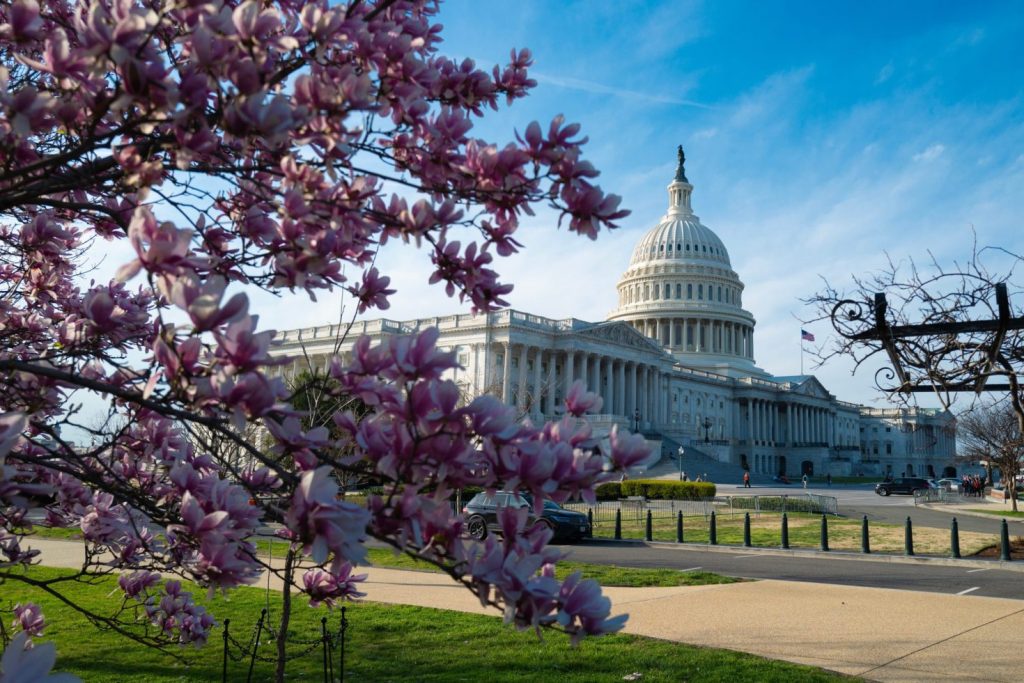Corporate climate policy still works: 4 lessons from 100 meetings on Capitol Hill in March
Look for advocacy opportunities that are as high impact and low risk as possible. Read More

Key takeaways
- Despite popular belief, conversations happening on Capitol Hill regarding clean energy tax credits and incentives are cordial, respectful and productive.
- Government affairs and sustainability teams can work closely to ensure advocacy opportunities are as high impact and low risk as possible.
- Even if lawmakers don’t care about climate change, framing environmental issues in terms of things they do care about — U.S. competitiveness, job creation and more — can transcend politics.
U.S. sustainability professionals have faced daunting challenges in the opening months of 2025. The Trump administration appears resistant to climate action and a series of executive orders and new tariffs have added to the uncertainty. All of this makes it hard to push for strong climate policies. But from where I sit, sustainability leaders have the opportunity to transcend the politics of the moment with compelling stories about the business case for long-term investments in the clean energy economy. Last month, I helped convene dozens of large companies on Capitol Hill to do just that — and I learned a lot from the experience.
In this volatile moment, here are a few ways sustainability leaders can better align their specific climate goals with their company’s policy engagement strategy:
Find strength in numbers
In March, at the outset of the ongoing budget negotiations in Washington, 80 large companies and investors took to Capitol Hill for meetings with about 100 Congressional offices, the vast majority of which were Republican, to call on lawmakers to keep federal clean energy tax credits and incentives in place. The message was direct, but the conversations were incredibly cordial, respectful and productive. Importantly, we have not heard of a single company receiving any kind of political blowback as a result.
In fact, the feedback has been quite the opposite: just days after we left D.C., 21 Republican members of Congress released a letter emphasizing their support for maintaining the incentives amid ongoing tax debates. And this month, four Senate Republicans followed up with a supportive letter of their own.
There are many ways to attribute this success, but undoubtedly one of the most important is that the large-scale, cross-sector and collective business voice created a virtuous cycle. Not only did it provide validation to lawmakers that leading companies want and need clean energy tax credits, but the multi-sector “big tent” approach creates a comfortable and safe space for businesses to direct their advocacy, further amplifying the impact. Businesses committed to climate and sustainability leadership can join cross-sectoral opportunities such as these and consider putting their name on strategic sign-on letters and other opportunities to collectively weigh in.
Link policy priorities to business goals
Climate change will affect the entire economy, so at some level all climate policies are business concerns. But that concept is too broad and abstract to drive meaningful policy action. Effective business advocates lead with the issues that are central to their business’s operations. Ford Motor Co., for example, has publicly advocated for maintaining federal clean vehicle and battery tax credits, which have guided the company’s long-term investment decisions and are key to growing the manufacturing and adoption of electric vehicles.
While that example gets directly at Ford’s business operations, companies should have no trouble advocating for more tangential policies that have a clear business impact. With energy prices too high and the grid constrained, it makes sense for nearly every company to advocate for policies that support the rapid deployment of clean energy resources such as solar and battery storage, as they’re the most affordable and quickest-to-build forms of new power.
Prioritize government affairs
Sustainability and government affairs teams need to work closely together during this turbulent time. Government affairs staff are understandably buried by the barrage of complex and unpredictable policy changes coming their way. Sustainability professionals should flag discreet policy priorities early and often, and make a compelling case that links timely advocacy to core business priorities.
They can also ensure that advocacy opportunities are as high impact and low risk as possible. Think about ways to frame issues in a way that will appeal to lawmakers who simply may not care about climate change or pollution — but could be receptive to arguments about clean energy affordability, job creation, global U.S. competitiveness and innovation. Time and time again, we’ve seen that the economic case can transcend politics. And there are ample opportunities to work as part of a group with peer companies or with businesses across sectors.
Consider corporate credibility
While it’s understandable that a changing political environment could affect companies’ approach to publicly supporting climate policy, it’s conspicuous when a business that once described something as a core principle no longer prioritizes it. No one is expecting companies to weigh in on or respond to every individual policy move. But investors — who continue to prioritize corporate climate advocacy — will take note if businesses aren’t engaging. Lawmakers will notice as well. Silence, after all, is a message of its own.

Subscribe to Trellis Briefing
Featured Reports

The Premier Event for Sustainable Business Leaders
















